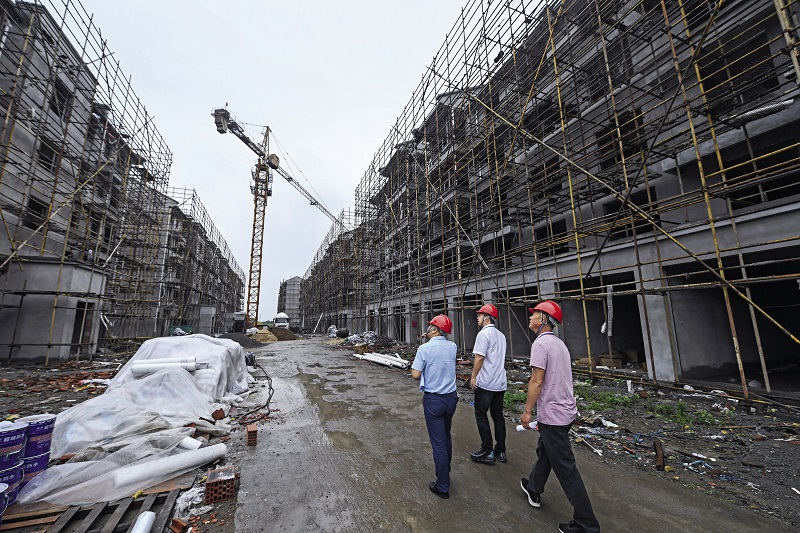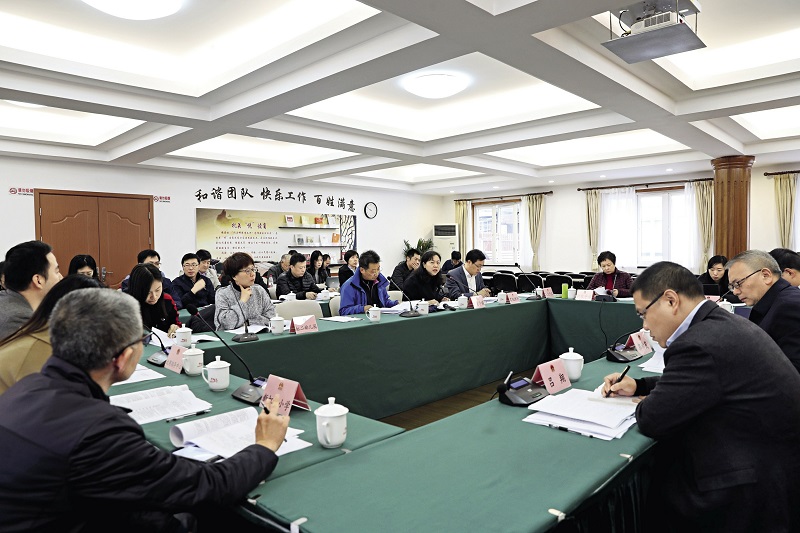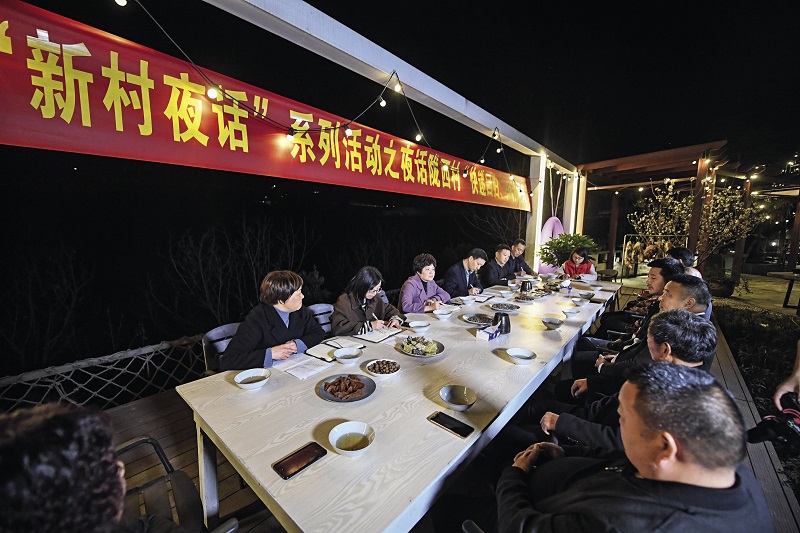The whole-process democracy is taking root across China.

Deputies to the local people’s congress and village representatives supervise the construction of apartment buildings created for the residents of Xinghuo Village in Huzhou, Zhejiang Pro-vince, on June 2, 2021. (Xinhua)
On the third floor of the Gubei Civic Center in Shanghai’s Hongqiao Subdistrict, a small group of residents are discussing how to use smart technologies to make senior citizens’ life more convenient.
In another hall at the center, a meeting is being held to collect opinions from the public on adding new infrastructure to one of the subdistrict’s commercial streets. Residents discuss the new infrastructure that is needed, what the standard for the new infrastructure should be and how the projects should be implemented.
Such practices of democratic consultation and decision-making have become the norm in Hong-qiao Subdistrict. Since a Legislation Opinion Collection Station was established at the center six years ago, the center has collected public opinions on 55 draft laws and provided 1,056 suggestions to the Standing Committee of the National People’s Congress (NPC), the country’s top legislature, and 92 of them have been accepted.
In November 2019, President Xi Jinping inspected the center, where he said, “People’s democracy is a type of whole-process democracy.” This was the first time the concept was publicly put forward.
China’s socialist whole-process people’s democracy can be understood as “from the people, to the people, with the people, and for the people,” said Xu Wenhong, a research fellow with the Chinese Academy of Social Sciences. It covers the whole process of election, decision-making, management, and supervision, in order to meet people’s needs and solve their real problems, Xu said.
Given China’s huge population and its complex social structure, to protect the rights and interests of people from all walks of life, the country should have a real people-centric political system, said Liu Dongchao, a professor with the Party School of the Communist Party of China (CPC) Central Committee.
Chinese socialist democracy takes two important forms: In one, the people exercise their right to vote in elections; and in the other, people undertake extensive deliberations before major decisions are made, said Li Junru, former vice president of the Party School of the CPC Central Committee. In China, these two forms are complementary, and they constitute the institutional features and strengths of Chinese socialist democracy, he said.
“The essence of the people’s democracy is that people get to discuss their own affairs to reach the greatest common ground based on the wishes and needs of the entire society,” Xi said in February 2019 at a “courtyard meeting hall” where community members discuss and decide their own affairs.
“Without democracy, there would be no socialism, socialist modernization, or national rejuvenation,” Xi said.

A meeting is held to solicit opinions about the amendments to the Minor Protection Law and the Law on the Prevention of Juvenile Delinquency by the Legislative Affairs Commission of the Standing Committee of the National People’s Congress in Hongqiao Subdistrict, Shanghai, on November 27, 2019. (Xinhua)
Effective and Reflective
With whole-process democracy, people’s interests are protected through extensive and effective multilateral and multi-level consultations in various aspects of social life.
“The public should be empowered to participate in the legislative process,” said Hu Yuang, secretary of the Party Work Committee of Hongqiao Subdistrict and director of the legislative outreach office of the Legislative Affairs Commission of the NPC Standing Committee in Hongqiao. The station has collected opinions from local communities and enterprises, and the NPC Standing Committee’s Legislative Affairs Commission has also visited the station to listen to legislation suggestions.
“The Anti-Domestic Violence Law was the first law on which we solicited opinions, and the Civil Code is the law for which we collected the largest number of suggestions,” said Ling Yan, deputy director of the legislative outreach office of the Legislative Affairs Commission of the NPC Standing Committee in Hongqiao. The laws are displayed at the station and local residents feel a sense of pride when they see the legal documents that have adopted their suggestions. Those whose suggestions have been taken include high school students, retired workers in their 80s, and academics.
The station has become a window for people from foreign countries to learn about China’s democracy. So far, it has received 30 overseas delegations. In June, 2021, the International Department of the CPC Central Committee invited the ambassadors of over 40 countries to visit the station. Chile’s Ambassador to China Luis Schmidt Montes said when visiting the station, “All people can express their opinions and participate in the law-making process. This is an excellent democratic decision-making system, which is important for the community and the country.”
In addition to state affairs, the public also have their say in everyday matters that concern them. Hu said the station not only solicits suggestions on legislation, but also provides a space for residents to participate in community affairs. The concept of whole-process democracy has been applied to the subdistrict’s community management. For instance, when installing elevators in old compounds, the station collected opinions from the public so as to satisfy the public’s demands to the largest extent.
In September, the station was designated as a research and practice base for whole-process democracy by the Shanghai Municipal People’s Congress. The new designation aims to see the station become a channel for learning about and understanding the socialist democratic political system with Chinese characteristics.
Hu said the base was established to further explore whole-process democratic decision-making and consultation under the leadership of the Party, and form an atmosphere of solving problems through public consultation to increase people’s awareness of the concept of whole-process democracy.
On the day the base was established, a meeting took place to discuss the installation of the elevators in some of the old compounds in the area. Representatives from the compounds, Hongqiao Subdistrict Office, property management enterprises and the company undertaking the elevator installation project together discussed problems such as how to balance the interests of residents living on upper and lower floors and long-term maintenance plans for the elevators after they are installed.
The suggestions made at the meeting were then submitted to the Shanghai municipal government, which has established a public opinion solicitation system to address people’s concerns and fill the gap in government policies.
“The Hongqiao Subdistrict will continue to enrich the concept of whole-process democracy through its practices and work to become a window for telling the stories of socialist democracy with Chinese characteristics,” Hu said.

Deputies are not only participants in the making of laws and regulations, but should also be involved in the supervision of the enforcement of these laws.
Representing the People
In addition to legislation opinion collection stations at the community level, NPC deputies, representing the interests and will of the people, participate in legislation and act as a bridge to the people.
The NPC is the highest state organ of power. The NPC and its standing committee exercise the legislative power of the state. In addition to the national one, there are also local people’s congresses that perform duties such as deciding on local economic, cultural, and public service development plans.
The system of people’s congresses is an important institutional vehicle for realizing whole-process people’s democracy in China, Xi said last October at a central meeting on the work of the people’s congresses.
In Beijing, the Standing Committee of the Beijing Municipal People’s Congress has carried out a series of activities in recent years to apply the concept of whole-process democracy to legislative processes, giving more play to the role of deputies.
In formulating regulations on both garbage sorting and property management, the standing committee has organized people’s deputies to visit local communities to collect residents’ opinions about the draft regulations.
In just over one month in 2019, over 12,000 deputies had collected opinions from over 240,000 residents, community workers, property management staff members and sanitary workers.
Topics such as appropriate fines for violations of garbage sorting rules and restrictions on the use of packaging were discussed by local residents and people’s deputies.
The practice of deputies soliciting opinions from the public has later been applied to the formulation and enforcement of a number of other regulations, including the regulation on preventing food waste, and has now become established as a replicable model.
Deputies are not only participants in the making of laws and regulations, but should also be involved in the supervision of the enforcement of these laws. From July to October 2020, 13,000 deputies had supervised the enforcement of the regulation on garbage sorting and the regulation on property management in over 5,000 residential compounds and more than 3,000 villages.
Supervision of the enforcement of these laws by people’s deputies is an important part of whole-process democracy. It is a way to ensure the laws are enforced so as to improve the degree of public satisfaction with enforcement efforts.
In recent years, Beijing has upheld the people-centered approach and established a system for swiftly responding to people’s concerns expressed through the 12345 resident service hotline and its online platform.
Deputies talked face-to-face with residents in their neighborhoods to solicit their opinions. In June 2021, six deputies sat together with nearly 20 residents to discuss a draft regulation on swiftly responding to people’s concerns and solving their problems. Residents had provided useful suggestions for the legislation.
Moreover, the standing committee also invited residents who had dialed the hotline to take part in a meeting to provide feedback on whether their problems had been solved and whether their expectations had been met.
Wei Jiawen was one of the residents invited to the seminar. She was given a list of questions before the seminar, including those on her suggestions for improvements, and on whether she would be willing to accept mediation if a problem couldn’t be solved immediately. She asked her relatives and friends the questions and then expressed their opinions at the seminar.
Yi Ran, a deputy to the Beijing Municipal People’s Congress, made a PowerPoint presentation of the draft regulation, explained it to residents in his community and listened to their suggestions.
The Haidian District People’s Congress compiled opinions on the draft regulation collected by people’s deputies and sent it to the deputies to the Beijing Municipal People’s Congress.
Since residents and enterprises alike may express their concerns through the hotline, the deputies are able to collect a wide range of opinions.
On September 24, the regulation on swiftly responding to people’s concerns and solving their problems was passed at the 33rd session of the 15th Standing Committee of the Beijing Municipal People’s Congress.
By soliciting public opinions, the legislation has been able to reflect the will of the people. People have been deeply involved in the legislative process and the legislation has not only spoken for the people, but also been dominated by the people.
JI JING is a reporter with Beijing Review.
(The story was first published by Beijing Review.)